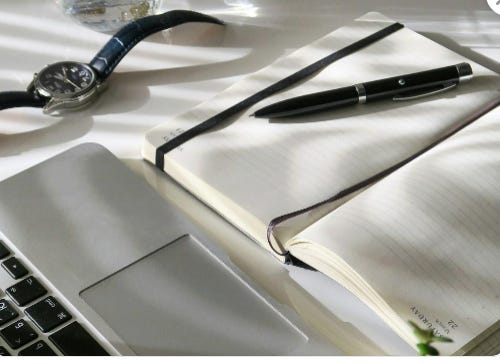In March 2020, at the dawn of the pandemic, my good friend Barbara Pollack and her colleague Ann Verhallen launched Art at a Time Like This, a nonprofit arts organization, as a direct response to social and political events. From the start, their mission was bold: to support artists and curators in the 21st century by presenting art in direct response to current events.
At the time, the question was often asked: How can someone think about art at a time like this, at a time of profound crisis and peril? Digital-first by both necessity and vision, Art at a Time Like This refused to separate creativity from crisis.
In the past several weeks, as I’ve started my final year in the MSW program at Fordham University and begun my internship at Everytown for Gun Safety—where I’m designing a trauma-informed writing program for gun violence survivors—I’ve been reflecting on the role of creative expression, and specifically writing, at a time like this.
For me, it’s less about wondering how to write, and more about feeling—in our bodies—the truth that we need to write to heal. Writing is our surest path back to truth, to emotional well-being, and to connection with one another.
Writing Is Not Retreat
Constant exposure to violent news distorts our perception of reality and leaves us feeling helpless—a phenomenon psychologists have call Mean World Syndrome. Media fatigue is real; it drains us and tempts us to go silent, and cultivates a culture of fear, paralysis, and isolation.
Psychologist and communications scholar George Gerbner coined this term in the 1970s. It refers to the way heavy exposure to violent or negative content in the media (first television, now dramatically increased with exposure to digital platforms). This phenomenon can lead people to believe the world is more dangerous, hostile, and frightening than it actually is. This doesn’t mean we don’t live in a dangerous world; we do. The point is that the more time we spend consuming these images, the more our fears escalate.
There’s another truth we can lean into: expressive writing reduces stress, lowers anxiety, and restores a sense of agency. Writing is not an indulgence. Writing is survival. It is one of the ways we metabolize overwhelm, bear witness, and find our footing again, and find our way back to each other.
And in my work at Narrative Healing, we’re exploring how, when you add mindfulness and attunement to the embodied experience, this sense of wellness, wholeness, and connection deepens even further.
Writing is one of the ways we metabolize chaos. It is how we bear witness, how we refuse erasure, how we remember what it means to be human. To write is to slow down the swirl of the world long enough to say: this happened, and I was here, and my story can help you.
A Practice of Healing
Here’s what we know:
Writing heals.
Writing makes us feel better.
Writing connects us to ourselves and to each other.
A writing practice makes us better at our jobs, better empaths, supporters, friends, and family members.
It builds confidence and self-worth.
It lowers feelings of despair, depression, anxiety, and suicidal ideation.
It helps with addictive behaviors.
It increases joy, belonging, connection, and worthiness.
A Practice of Steadiness
Writing at a time like this doesn’t mean producing the perfect essay or finishing a book in a month.
It can be as simple as ten minutes at the kitchen table. A sentence in the Notes app on your phone. A single word that catches your breath and makes you pause.
Even the smallest act of writing can be a way of grounding, a way of steadying yourself in the storm.
So if you’ve been waiting for the world to calm down before you write—consider this your invitation to start small. Take a breath. Put one line on the page. And notice what shifts.
How Can We Not?
As Barbara has said, “How can we rethink art at a time like this? How does crisis make us think about art differently? What kind of art can we make in response to crisis?”
The same is true for writing. Because when we write, we are not turning away from the world. We are finding a way to stay with it. We are creating space for grief, for memory, for imagination. We are building the futures we long for, word by word.
And we don’t have to do it alone.
If you’ve been waiting for the world to calm down, I invite you to begin now. Take ten minutes. Take three grounded breaths. Put pen to the page. Notice what shifts. And if you want company along the way, come write with us.
Your voice belongs here. Our voices belong together.



Thank you Lisa. This is so beautiful.
Such an important message!